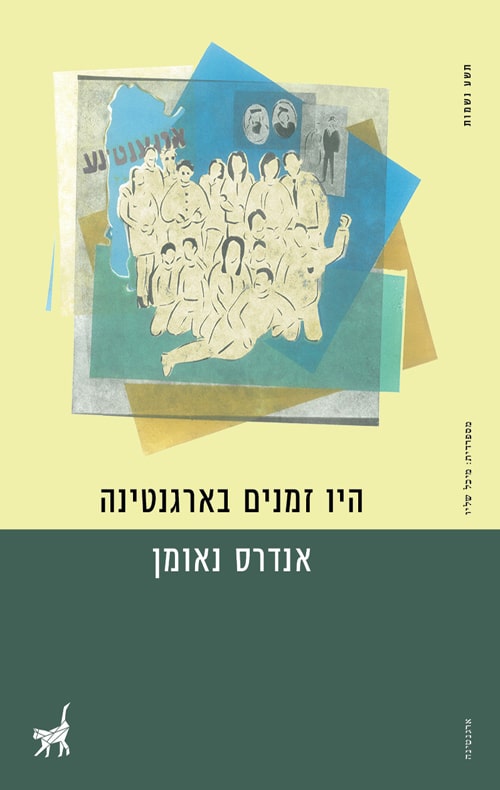For English review, please scroll down.
ספר נפלא המרכז סיפורים אוטוביוגרפים מחייו וחיי משפחתו של המחבר שנולד ב 1977 בארגנטינה ומאוחר יותר, בשנות ה 90, היגר עם משפחתו לספרד.
"הם כואבים כשהם חוזרים? או שהם מתחילים להחלים כשהם חוזרים, ואז אנחנו מגלים שכבר מזמן הם כואבים, הזיכרונות? אנחנו נעים בתוכם. אנחנו הנוסעים שלהם. יש לי מכתב וזיכרון חרד. המכתב הוא מסבתי, בּלַנקה. השורות מטושטשות מעט. הזיכרון הוא שלי, אף שהוא לא שייך רק לי. טבוע בו הפחד הקבוע: להיעלם לפני שמספיקים לדבר. אני יוצא למסע לאחור."
לעלילה המרכזית הקדימה ההוצאה מבוא לאירועים ההיסטוריים ולמושגים שמוזכרים בספר וטוב שעשתה כך. המבוא התמציתי מותח קו תמטי בין האירועים ההיסטורים שיוזכרו בסיפוריו של נאומן ובין גורלם של בני משפחתו. ההקשר ההיסטורי של האירועים, מעגן את הקורא בחלקים שבהם הסיפור אינו ליניארי ולעיתים קופץ מתקופה לתקופה ומדמות לדמות.
הכתיבה של נאומן מאופיינת באקלקטיות שלא שומרת על מסגרת נוקשה של זמנים או של אירועים, אלא שוצפת ובאופן רופף צמודה לזרימת הזמן. היא בעיקר מאופיינת באסוציאטיביות ועוקבת אחרי הזמן דרך הסיפורים של הדמויות השונות שמאכלסות את הספר, היא מהחוזקות של הכתיבה של נאומן. הקורא זוכה להכיר את בני משפחתו של נאומן ודרך עינהם וההיסטוריה הפרטית שלהם את ההיסטוריה הכללית של ארגנטינה.
החל מסבא רבא שלו שבעורמה "גנב" את שם משפחתו מחייל גרמני ובכך ניצל מגיוס לצבא רוסיה הצארית. עובר דרך דודתו, שבין המשמרות שביצעה בחנות הספרים של המשפחה, גם עבדה כאדריכלית.
כאשר יום אחד, לאחר הפיכת 1976, נעלמו עקבותיה נאלצה המשפחה לפנות לאחת, חברת פרלמנט שבין תכונותיה הראויות לציון מונה נאומן את העובדה שהיא היתה אחייניתו של קולונל בצבא.
תיאור שיחרורה של הדודה הסוררת, שכל חטאה היה הפחד של המשטר מהפצת רעיונות הנוגדים את התרבות המערבית והנוצרית, הוא רק אחד מהסיפורים שהומור שחור שזור בו בכאב העינויים והבחילה –
"האקס־פרלמנטרית החרוצה אפילו לא עברה חדר, ואחרי הקפה והעוגה הרימה את שפופרת הטלפון, חייגה מספר מהזיכרון וביקשה לדבר עם הקולונל. כשחיכתה לתשובה שלחה אל אורחיה חיוך מרגיע. אחר כך אמרה בפשטות: "בטוח שהם לא קשורים לשום דבר, נכון?""
ובין לבין, חלקים שכוללים זיכרונות משנות ילדותו חלקם מאירים, שמחים. אבל, על רובם מרחפת התמודדות עם מציאות אפופת ריח שריפה והריגה שעולים מטירוף משטרי ורדיפה בלתי פוסקת של נאמני המשטר הרצחני. החלקים שעוסקים בטירור הפחד חזקים, טורדי מנוחה:
"היכן מחכה האויב: בחוץ או בפנים? לְמה משמש גבול: כדי ששום אויב לא יוכל לחדור פנימה, או כדי שיהיה מאיפה לברוח? כשהצצתי ממרפסת ביתי, בין העציצים החמים, ראיתי את הטנקים נעים בשדרת אינדפנדנסיה. בחוץ לא היתה נפש חיה."
יש בכתיבה של נאומן משהו מאוד אינטימי, חם ואוהב כלפי משפחתו וחבריו על הטיפוסים האקסצנטרים וההמוזרים שסובבים אותו. יש בכתיבה גם משהו רווי געגוע לארגנטינה על כל הכאב והצער שכרוך בזיכרון שלה.
היו זמנים בארגנטינה / אנדרס נאומן
הוצאת תשע נשמות, 2019, 312 עמודים
דירוג SIVI –
איכות אודיו –

It is an excellent book that gathers autobiographical stories from the author's life and family. The author was born in 1977 in Argentina and later, in the 1990s, immigrated with his family to Spain.
The book starts with a brief introduction to the historical events and concepts that will be mentioned in Nauman's stories. This introduction is helpful as it draws a thematic link between the historical events and the fate of his family members. The historical context anchors the reader in the parts where the story is not chronological and sometimes jumps from one character to another. Overall, the concise introduction provides a good foundation for the main plot.
Neuman's writing is characterized by eclecticism, as it does not rigidly follow a framework of times or events. Instead, it loosely and associatively follows the flow of time, mainly through the stories of the various characters that populate the book. This approach is one of the strengths of Nauman's writing, as it allows the reader to get to know the members of Nauman's family and, through their eyes and private history, learn about Argentina's general history.
The author's family history is quite interesting. It all started with his great-grandfather, who secretly took the last name of a German soldier to avoid being drafted into Tsarist Russia's army. The name has been passed down through the generations.
His aunt was also a fascinating figure in the family. In addition to working shifts at the family's bookstore, she was also an architect. After the 1976 coup, when all traces of her disappeared, the family sought help from a member of parliament who was the niece of an army colonel.
A description of the release of the disobedient aunt, whose only sin was the regime's fear of spreading ideas against Western and Christian culture, is just one of the stories in which black humor is woven into the horrendous pain of torture.
The book contains a mix of memories from the author's childhood. While some of these memories are happy and enlightening, most paint a picture of a reality surrounded by the smell of burning and death caused by the madness of the regimes and the relentless persecution of the loyalists of the murderous regime. The parts of the book that deal with fear are solid and disturbing.
Neuman's unique writing presents his family and friends with an intimate, warm, and loving touch despite the eccentric and strange types around him. Additionally, his writing is filled with a sentimental longing for Argentina despite the painful and sorrowful memories associated with it.
לגלות עוד מהאתר Sivi's Books
Subscribe to get the latest posts sent to your email.

